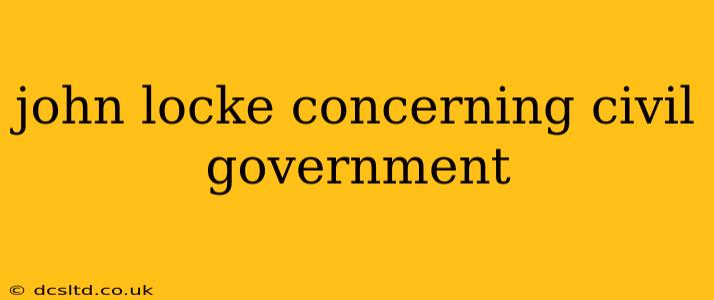John Locke's Two Treatises of Government, particularly the Second Treatise, is a cornerstone of Western political philosophy. Published anonymously in 1689, it profoundly influenced the development of liberal democracy and continues to spark debate and analysis centuries later. This treatise lays out Locke's vision of a social contract, natural rights, and the legitimate limits of governmental power. Understanding Locke's arguments is crucial for grasping the foundations of modern political thought.
What are the main ideas in Locke's Two Treatises of Government?
Locke's Second Treatise rejects the divine right of kings, arguing instead that government derives its legitimacy from the consent of the governed. His core tenets revolve around several key concepts:
-
Natural Rights: Locke posits that individuals possess inherent rights that pre-exist government. These include the rights to life, liberty, and property. These rights are not granted by a ruler or a society but are inherent to being human. The government's role is to protect these rights, not infringe upon them.
-
State of Nature: Locke describes a "state of nature" preceding civil society, where individuals are governed by natural law. This isn't a state of war, as some might assume, but rather a state where individuals are free and equal, bound by reason to respect each other's rights. However, the lack of an established judicial system and the potential for conflict necessitate a transition to civil society.
-
Social Contract: To overcome the limitations of the state of nature, individuals voluntarily enter into a social contract, forming a government to protect their natural rights. This contract is not a one-time agreement but an ongoing relationship between the governed and the government.
-
Limited Government: Locke champions a limited government, believing power should be clearly defined and constrained to prevent tyranny. He advocates for the separation of powers and emphasizes the importance of checks and balances to ensure that government remains accountable to the people.
-
Right of Revolution: A crucial element of Locke's theory is the right of revolution. If the government fails to uphold its end of the social contract – if it systematically violates the natural rights of its citizens – the people have the right to alter or abolish it. This right, however, is not to be taken lightly and should only be exercised as a last resort.
What is the significance of Locke's concept of natural rights?
Locke's concept of natural rights is revolutionary. By arguing that individuals possess rights prior to government, he challenges the notion that rulers hold absolute power. This idea profoundly impacted the American and French Revolutions, providing philosophical justification for rebellion against oppressive regimes. The emphasis on inherent rights continues to shape contemporary debates about individual liberties and the role of the state.
How does Locke's idea of the social contract differ from Hobbes'?
While both Locke and Hobbes utilized the concept of a social contract, their perspectives differed significantly. Hobbes, in his Leviathan, envisioned a social contract as a necessary evil to escape the brutal state of nature. He argued for a powerful sovereign to maintain order, even at the cost of individual liberties. Locke, conversely, viewed the social contract as a means to protect individual rights and limit government power. This fundamental difference reflects their contrasting views on human nature and the purpose of government.
What is the role of property in Locke's political philosophy?
Property plays a central role in Locke's political philosophy. He believed that individuals have a natural right to acquire and possess property through their labor. This right, he argued, is essential for individual liberty and economic prosperity. His views on property have been both influential and controversial, sparking ongoing discussions about private property rights and their relationship to social justice.
What are the criticisms of Locke's philosophy?
Despite its immense influence, Locke's philosophy has faced criticism. Some critics argue that his concept of natural rights is vague and lacks a clear definition. Others question his justification for private property, particularly concerning its impact on social inequality. Furthermore, the right of revolution, while empowering, can be interpreted as a justification for violence and instability.
John Locke's Concerning Civil Government remains a powerful and relevant text. Its exploration of natural rights, limited government, and the social contract continues to shape political discourse and inspire debates about the ideal relationship between the individual and the state. While not without its critics, its influence on the development of liberal democracy is undeniable.
